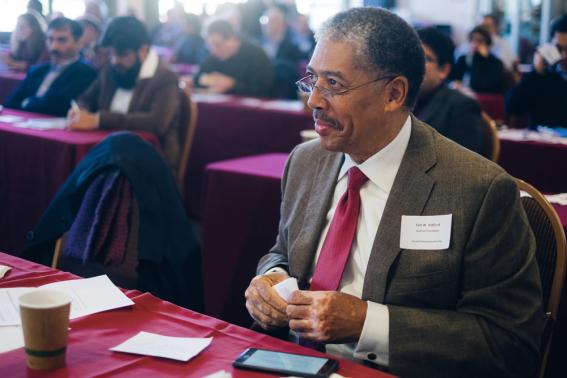Earl Stafford '76: The Business of Giving
May 23, 2017
“What’s important is that you dream,” advises the 2017 Isenberg Business Leadership Awards (IBLA) honoree Earl W. Stafford ’76. “Dream not only of what is possible, but of what you consider to be improbable—and go for it,” urges the Isenberg graduate. That entails “using your success to go out and help others. It is just as important to business education as accounting or finance.”
In pursuit of those dreams, a business skill set is critical, Stafford insists. “Young people should have a basic knowledge of business. No matter who you are or what you do, you need to employ resources efficiently and effectively,” he emphasizes. Everybody, he says, gains by learning business skills. Business schools like Isenberg, then, have a crucial responsibility.
Entrepreneurship at Isenberg

“Mr. Stafford supports a broad range of mainstream and social entrepreneurship activities at Isenberg,” notes The Earl W. Stafford Professor in Entrepreneurial Studies, Tom Moliterno, who is also Vice Dean of the Isenberg School. “The professorship provides direct support for our annual social entrepreneurship day, my own research, the social entrepreneurship club, and a campus-level round of the international Hult Prize Challenge,”* he remarks. “In addition, his annual gift helps energize the Berthiaume Center and its mainstream entrepreneurism programs, in particular a new on-campus business accelerator that will pilot this summer. In a year’s time, the accelerator should be at full strength, housing ten student teams.”
Career Adaptation and Resilience
“We need to teach young people in business schools that there are alternatives to working in the corporate world, including entrepreneurship and nonprofit organizations,” observes Stafford. His own career has been a case in point. Twelve years after graduating from Isenberg, the entrepreneurial alumnus launched Unitech, a worldwide supplier of Multiple Integrated Laser Engagement Systems for military weapons simulations and interactive training.
Since selling the company to Lockheed Martin in 2009, Stafford has focused on two ventures. Through his privately held equity firm, the Wentworth Group, he invests in commercial, technology-focused small businesses. Through the Stafford Foundation, which he launched in 2002, he empowers people and organizations through giving that yields self-sufficiency and sustainability.
The foundation’s Give Before You Get program partners with service organizations to involve the homeless and other at-risk populations in community service. The foundation’s Stafford Center in Burkina Faso houses 24 orphaned boys and girls. It is active in community education and church activities. And the foundation’s Doing Good project fosters volunteerism and sharing of volunteer narratives through conversation, social media, and other communication channels. Its grants to nonprofit organizations and initiatives help recipients to become self-sufficient while inspiring others.
Perhaps the foundation’s highest-profile undertaking was its People’s Inaugural Project in 2009. That initiative brought 400 disadvantaged citizens to President Obama’s inauguration, where they participated in a People’s Inaugural Ball, a prayer breakfast, luncheon, and other events.
Isenberg Roots and Branches
Stafford joined Isenberg during his twenty-year career in the military. Leveraging an Air Force scholarship, he chose UMass and Isenberg because “it was what I like to call a very large small school,” he explains. “It had all the resources I needed, but I never got lost. And I always felt that people cared about me, including my management professor, Tony Butterfield.Most people don’t want a handout; they want a hand.
“Most people don’t want a handout; they want a hand. They want dignity and respect,” emphasizes Stafford. His advice for Isenberg’s own sustainable progress: “We need to do a better job of teaching our students to be socially responsible before we let them out the door. That includes recognizing their responsibility of contributing to Isenberg’s success.”
*This year’s challenge asks student teams “to build sustainable, scalable start-up enterprises that will restore the rights and dignity of 10 million people by 2022.”